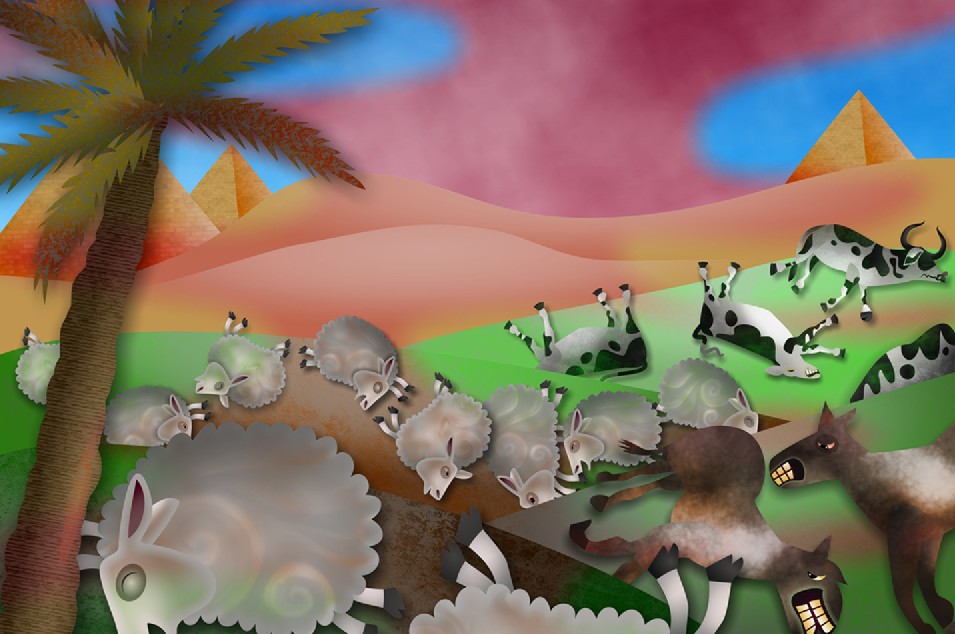Faith
Were the Ten Plagues of Egypt Natural Events or Miracles? A Jewish Perspective
How the Torah and Jewish tradition explain the plagues, the splitting of the Red Sea, and why these events were clear divine miracles beyond nature
- Daniel Blass
- |Updated

Uri asks: “Shalom. I recently met a childhood friend who has not yet returned to faith. He claims that the plagues of Egypt could have occurred naturally, and that people in the past were primitive and didn’t understand reality.”
* * *
Shalom Uri, and thank you for your question. If your friend is sincerely seeking truth, encourage him to visit the Hidabroot website.
Before addressing the question, let’s clear up a common misconception. Ancient people were not “primitive” as portrayed by modern media. To this day, scholars struggle to understand the astonishing genius of early civilizations, including their advanced astronomical knowledge, architectural brilliance, philosophy, mathematics, and natural medicine. They knew how to preserve bodies for thousands of years and build massive structures with incredible engineering sophistication. (The Great Pyramid of Giza is composed of 2 million huge stones, each weighing about 2.5 tons)
Ancient people were not simple-minded tribes staring at a rainbow or solar eclipse and believing they saw gods. The wise always connected natural events to divine will, but they did not deny the natural element. Likewise, the common belief that idolaters worshiped statues because they thought the statue itself was a god is not accurate. They used idols as a way to connect to higher beings or angels, not because they thought stone itself was divine. Even in the sin of the Golden Calf, the people sought to serve God through an image — something forbidden by the Torah, rather than thinking the calf was itself a god.
Human beings thousands of years ago understood nature, tracked celestial events, predicted eclipses and comets, mapped lands and seas, and built kingdoms and empires. They were far from “primitive.”
Were the Plagues Merely Natural?
The claim that the Ten Plagues of Egypt were natural occurrences has been made throughout history, but it never stands up to scrutiny.
A famous story tells of Napoleon Bonaparte, who attempted to time the crossing of the Red Sea using tidal charts calculated by his finest scholars, to prove the Israelites had crossed naturally. But when Napoleon and his army attempted it, the waters suddenly surged back with full force, nearly drowning them. Napoleon himself admitted afterward that the splitting of the sea was a divine miracle beyond human timing.
However, we do not need Napoleon’s failed experiment to know the truth. The Torah describes the events of the Exodus in detail, as historical records, not as myths. The plagues are presented as direct, supernatural disruptions of nature’s laws.

God’s Mastery Over All
Through the Ten Plagues, God demonstrated His control over every aspect of creation:
Water: Turning the Nile to blood.
Small creatures: Frogs and lice.
Large animals: Swarms of beasts.
Disease: Pestilence and boils.
Weather: Fire and hail together.
Agriculture: Locusts destroying crops.
Cosmos: Darkness over Egypt while Israel had light.
Life itself: The death of the Egyptian firstborns.
The Torah emphasizes that every firstborn in Egypt died in the same moment, while the Israelites were untouched, marked by blood on their doorposts. This was no natural disaster, but a precise act of divine will.
The timing, precision, and selectivity of each plague prove they were not random natural events. No natural phenomenon could occur in such an orderly, predicted, and controlled way. Each plague began only after Moses warned Pharaoh and ended instantly when Pharaoh yielded.
Beyond the Plagues
The miracles did not end in Egypt. The splitting of the Red Sea is described explicitly: “The children of Israel went into the sea on dry land, and the waters were a wall to them on their right and on their left” (Shemot 14:22). This was not low tide, but an impossible event of the sea splitting into walls of water that stood upright all night, allowing an entire nation to cross. Pharaoh’s army drowned when the walls collapsed back into place.
The plague of darkness also highlights its supernatural nature: “But all the children of Israel had light in their dwellings” (Shemot 10:23). This was not just a desert sandstorm, but targeted, purposeful, and miraculous.
For forty years in the desert, Israel was led by a pillar of fire at night and a pillar of cloud by day, fed by manna from heaven, given water in miraculous ways, and protected through countless wonders.
The Torah presents these events not as natural coincidences but as clear miracles that revealed God’s power. With such clarity and precision, the truth is undeniable: the plagues of Egypt and the miracles of the Exodus were acts of divine intervention, not accidents of nature.

